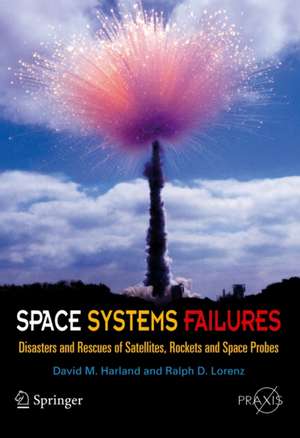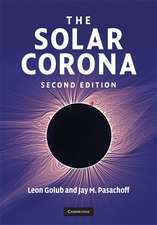Space Systems Failures: Disasters and Rescues of Satellites, Rocket and Space Probes: Springer Praxis Books
Autor David M. Harland, Ralph Lorenzen Limba Engleză Paperback – 31 mai 2005
Although Magellan successfully mapped Venus by radar, it suffered from problems during the flight. Then came the loss of Mars Observer, whose engine exploded as it was preparing to enter Mars’ orbit because it was using technology designed for Earth’s satellites and the engine was not suited to spending several months in space. Later came the high-profile losses of Mars Climate Observer and Mars Polar Lander - a consequence of the faster, better, cheaper philosophy introduced by Dan Goldin in 1993. Even the highly successful Galileo mission suffered a major setback when its high-gain antenna (also based on satellite mission suffered a major setback when its high-gain antenna (also based on satellite communication technology) failed to deploy fully, greatly diminishing the craft’s radio transmission capabilities, forcing the ground crew to re-programme the on-board computer to enable it to fulfil its mission and provide stunning images of Jupiter and its moons.
In Space Systems Failures, David Harland (here working with co-author Ralph Lorenz) describes the many quite fascinating tales of woe involving failures of rockets, satellites and deep space missions in his inimitable style, providing a unique insight into the trials and tribulations of exploration at the high frontier.
Din seria Springer Praxis Books
-
 Preț: 294.46 lei
Preț: 294.46 lei -
 Preț: 223.45 lei
Preț: 223.45 lei -
 Preț: 193.12 lei
Preț: 193.12 lei -
 Preț: 167.85 lei
Preț: 167.85 lei -
 Preț: 288.98 lei
Preț: 288.98 lei -
 Preț: 323.74 lei
Preț: 323.74 lei -
 Preț: 401.38 lei
Preț: 401.38 lei -
 Preț: 264.12 lei
Preț: 264.12 lei - 8%
 Preț: 513.00 lei
Preț: 513.00 lei -
 Preț: 190.01 lei
Preț: 190.01 lei -
 Preț: 218.16 lei
Preț: 218.16 lei -
 Preț: 312.06 lei
Preț: 312.06 lei - 17%
 Preț: 414.05 lei
Preț: 414.05 lei -
 Preț: 216.41 lei
Preț: 216.41 lei -
 Preț: 262.27 lei
Preț: 262.27 lei -
 Preț: 264.35 lei
Preț: 264.35 lei -
 Preț: 167.63 lei
Preț: 167.63 lei -
 Preț: 284.81 lei
Preț: 284.81 lei -
 Preț: 259.08 lei
Preț: 259.08 lei -
 Preț: 305.47 lei
Preț: 305.47 lei -
 Preț: 244.14 lei
Preț: 244.14 lei -
 Preț: 227.85 lei
Preț: 227.85 lei -
 Preț: 285.25 lei
Preț: 285.25 lei -
 Preț: 295.56 lei
Preț: 295.56 lei -
 Preț: 357.17 lei
Preț: 357.17 lei -
 Preț: 275.79 lei
Preț: 275.79 lei -
 Preț: 257.08 lei
Preț: 257.08 lei -
 Preț: 349.71 lei
Preț: 349.71 lei -
 Preț: 272.45 lei
Preț: 272.45 lei -
 Preț: 270.27 lei
Preț: 270.27 lei - 8%
 Preț: 456.51 lei
Preț: 456.51 lei -
 Preț: 352.34 lei
Preț: 352.34 lei - 8%
 Preț: 394.80 lei
Preț: 394.80 lei -
 Preț: 320.65 lei
Preț: 320.65 lei -
 Preț: 325.29 lei
Preț: 325.29 lei -
 Preț: 253.11 lei
Preț: 253.11 lei -
 Preț: 192.86 lei
Preț: 192.86 lei -
 Preț: 313.40 lei
Preț: 313.40 lei -
 Preț: 150.51 lei
Preț: 150.51 lei -
 Preț: 233.34 lei
Preț: 233.34 lei -
 Preț: 286.78 lei
Preț: 286.78 lei -
 Preț: 212.01 lei
Preț: 212.01 lei -
 Preț: 366.83 lei
Preț: 366.83 lei -
 Preț: 299.99 lei
Preț: 299.99 lei -
 Preț: 232.27 lei
Preț: 232.27 lei -
 Preț: 284.58 lei
Preț: 284.58 lei -
 Preț: 212.45 lei
Preț: 212.45 lei -
 Preț: 159.81 lei
Preț: 159.81 lei -
 Preț: 349.48 lei
Preț: 349.48 lei - 20%
 Preț: 2061.64 lei
Preț: 2061.64 lei
Preț: 338.46 lei
Nou
Puncte Express: 508
Preț estimativ în valută:
64.78€ • 70.39$ • 54.45£
64.78€ • 70.39$ • 54.45£
Carte disponibilă
Livrare economică 31 martie-14 aprilie
Preluare comenzi: 021 569.72.76
Specificații
ISBN-13: 9780387215198
ISBN-10: 0387215190
Pagini: 370
Ilustrații: XVIII, 370 p.
Dimensiuni: 152 x 229 x 20 mm
Greutate: 0.61 kg
Ediția:2005
Editura: Springer
Colecția Praxis
Seriile Springer Praxis Books, Space Exploration
Locul publicării:New York, NY, United States
ISBN-10: 0387215190
Pagini: 370
Ilustrații: XVIII, 370 p.
Dimensiuni: 152 x 229 x 20 mm
Greutate: 0.61 kg
Ediția:2005
Editura: Springer
Colecția Praxis
Seriile Springer Praxis Books, Space Exploration
Locul publicării:New York, NY, United States
Public țintă
Popular/generalCuprins
Launch vehicles.- The missiles.- The Shuttle.- Back to expendables.- Heavyweights.- Lightweights.- Boom and bust.- The Chinese experience.- The current crop.- Satellites and space probes.- Failure and redundancy.- Propulsion system failures.- Attitude control system failures.- Electrical failures.- Environmental failures.- Structural failures.- Failures on the ground.- Operator and software errors.- Conclusions.
Recenzii
From the reviews:
"Harland (space historian) and Lorenz (Univ. of Arizona, Tucson), using occasional flashes of humor, explore in depth the wide variety of causes of failure of space systems … . The material is very practical, punchy, and straightforward, presented in a refreshing writing style. The book contains many … illustrations, extensive references at the end of each chapter and a full 14-page index. … it is a must for scientists and engineers engaged in or planning a career in space systems. Summing Up: Recommended." (W. E. Howard, CHOICE, November, 2005)
"This book is the literary equivalent of the ‘tell-all’ TV documentary and should meet most of its readers’ vicarious interests in what can go wrong in – or on the way to –space. … The book is pretty well encyclopaedic … . The book is illustrated with black-and-white photos and diagrams … . On balance, this book is well researched and referenced … . Anyone involved in the design, manufacturing and operation of spacecraft and launch vehicles should read this book … and learn." (satellite-evolution.com, May/June, 2007)
"Harland (space historian) and Lorenz (Univ. of Arizona, Tucson), using occasional flashes of humor, explore in depth the wide variety of causes of failure of space systems … . The material is very practical, punchy, and straightforward, presented in a refreshing writing style. The book contains many … illustrations, extensive references at the end of each chapter and a full 14-page index. … it is a must for scientists and engineers engaged in or planning a career in space systems. Summing Up: Recommended." (W. E. Howard, CHOICE, November, 2005)
"This book is the literary equivalent of the ‘tell-all’ TV documentary and should meet most of its readers’ vicarious interests in what can go wrong in – or on the way to –space. … The book is pretty well encyclopaedic … . The book is illustrated with black-and-white photos and diagrams … . On balance, this book is well researched and referenced … . Anyone involved in the design, manufacturing and operation of spacecraft and launch vehicles should read this book … and learn." (satellite-evolution.com, May/June, 2007)
Caracteristici
The very first book on space systems failures written from an engineering perspective Focuses on the causes of the failures and discusses how the engineering knowledge base has been enhanced by the lessons learned Discusses non-fatal anomalies which do not affect the ultimate success of a mission, but which are failures nevertheless Describes engineering aspects of the spacecraft, making this a valuable complementary reference work to conventional engineering texts Provides extensive references to the literature for further reading















